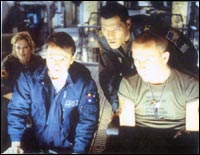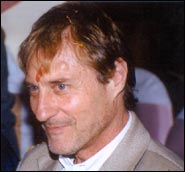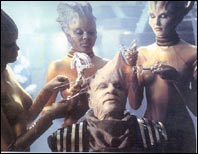Home > Movies > Interviews
'We are all prisoners of our own history'
M D Riti |
January 21, 2003 13:43 IST
History comes alive in an especially contemporary and touching way in his films.
Roland Joffe made history of sorts with The Killing Fields, his very first film as a director. Based on the experiences of New York Times reporter Sidney Schanberg in Cambodia, the film picked up three Oscars and earned Joffe a nomination for Best Director in 1984.
A veteran of British theatre and television, Joffe won another Best Director nomination and prizes at Cannes for The Mission, a visually spectacular story of the Jesuit priests in 18th century Brazil, two years later. Next, Joffe directed Fat Man And Little Boy (1989), about how America produced the atomic bomb; and City of Joy (1992), about an American surgeon (Patrick Swayze) living in Kolkata.
Joffe was in Bangalore last week for a science film festival in which Fat Man was premiered for the first time in India. He spoke to rediff.com Special Contributing Correspondent M D Riti about the new film he would soon start filming in India called The Invaders, set in the 18th century.
What made you decide to make The Invaders?
Ajey Jhankar of Neelmudra Entertainment came to me with this story. I was touched by its historicity. It deals with the early days of the British attempt to conquer India. The British fought against the Marathas and lost.
An unusual aspect of this war is that, for the first time, the death of a British officer was marked by a religious ceremony. The British officer who led the defeated army was actually memorialised. I found this very interesting.
Can you tell us more about the story?
It is essentially a love story. It is also a historical movie, of course. I would love to tell you the whole story now, but I really shouldn't be doing that. Actually, I have just finished the first draft of the story line and am yet to start on the second draft. So it is far too premature.
I may tell you some things about the story, and might change those things over the next few weeks.
Is it a love story between an Indian girl and a British officer, then?
That would be telling!
Will it be a historical love story set in the 18th century at the time of that historical battle?
Ajey suggested I should introduce an element of reincarnation in the story. At first, I thought that was silly. But then, this whole time dimension began to fascinate me. I began to feel that, in a sense, we were all prisoners of our own history. So the story stretches from the 18th century to Boston in 2010.
Conventionally, one looks at history as something of the past. But after [Albert] Einstein, who knows what is in the past and what is in the present?
When will you start filming this movie?
We should start pre-production work in May. It may get postponed to September though, because in India, one has to plan according to the monsoons.
What will be its locations?
Boston. Different parts of Maharashtra. Mostly these two places.
Have you decided on the cast?
We have certainly thought of some Indian actors. Some others. But the cast is yet to be finalised. I cannot give you possible choices -- if I mention some names, any other actors that I approached might turn me down because they would think they were my second choice!
How long have you been working on this project?
About one-and-a-half years now. I think a film should have a gestation period of at least two or three years.
Do you find working in India very different from working in other countries?
Of course it is. As different as sitting down to a meal with an Indian family is different from sitting down to a meal with a British family. Making the City Of Joy gave me the best political education of my life. It became a wrestling match between an Englishman who had gradually ceased to be a Marxist, and a culture that was becoming more Marxist by the day. It was really the experience of a lifetime.
Will you shoot Invaders twice, to make the English and Hindi versions, or just dub it?
We have not decided yet. That will be decided based on the budget.
What will the movie's budget be, then?
Let's just say it will be the right budget for the movie.
Will the film have music, as is the done thing in Indian mainstream cinema?
Music is a very integral part of the film, in some parts. It will not be as full of music as a Bollywood film. However, in this movie, there is a theatre company. What the company play says about [Lord] Krishna is very relevant to the plot of the film. So there will be some songs that will feature naturally in the plot.
Do you watch Indian movies?
Yes, several. Right from Bollywood films to Satyajit Ray masterpieces. There is a truly great tradition of moviemaking here in India. I cannot give you a critique of the Indian movie business, though!
There does seem to be an Indian influence in some of your other films. Mission, for example, has a strange spiritual quality to it.
Yes, that film was an extraordinary experience for me, from start to finish. When I went to South America for the first time, I looked for the Gorami tribe. I could not find them. Eventually, I did, but they were so decimated by years of being ignored that they could not look me in the eye.
I spent time livin g with another tribe that I eventually filmed. I cannot forget a conversation that I had with an elderly couple from that tribe. They suddenly asked me whether I would kill them after I had finished. When I asked them why they asked that, they replied, simply, "Because you white men always do!"
g with another tribe that I eventually filmed. I cannot forget a conversation that I had with an elderly couple from that tribe. They suddenly asked me whether I would kill them after I had finished. When I asked them why they asked that, they replied, simply, "Because you white men always do!"
That was when the history of the white man really jumped up and bit me in the neck. Eventually, the tribe developed so much confidence in me that they invited me to be their chieftain.
Do you think the spiritualism of India affects other dimensions of India life, like Indian science? I ask because you have also made Fat Man And Little Boy, a film that questions the morality of science.
Indian culture certainly gives the Indian mind, including the mind of the Indian scientist, the ability to think out of the box. Much of Indian science seems intuitive and not bound by the rigid thinking of classical scientists.
Incidentally, we will be using some extremely modern science in the making of The Invaders.